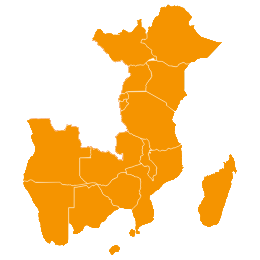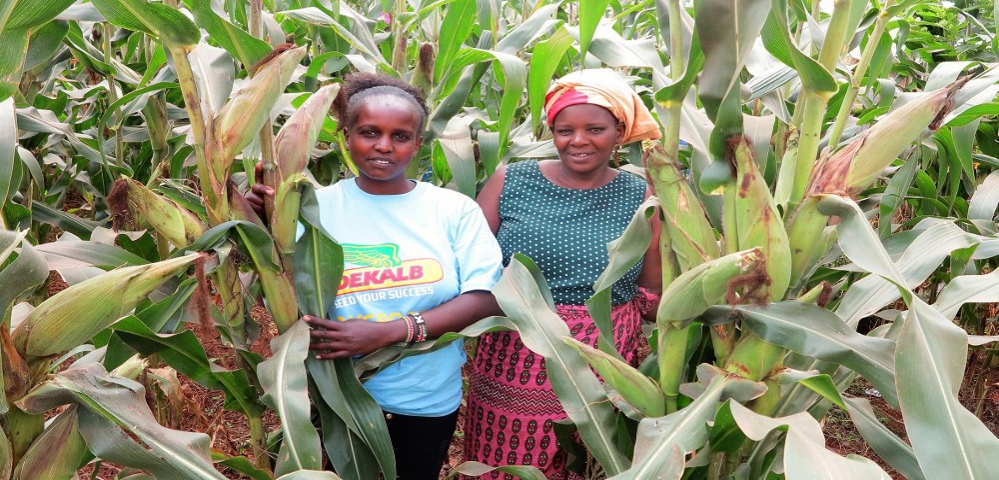Village-based Agricultural Advisors (VBAs)
"This is the very cow that used to produce as low as five litres of milk a day. Today I milk up to 13 litres a day,’ she proudly says as she gently handles her crossbred Guernsey dairy cow"
FIPS VBA Lillian Ochieng from Usaha village, Gem Sub County in Siaya CountyBACKGROUND
Millions of farmers in Africa lack access to the most appropriate methods to improve their farms. FIPS trains VBAs on how to promote good farming techniques with all willing farmers in their villages in a hands-on, inclusive way. This creates demand for appropriate farming inputs and provides incomes for VBAs who opt to become last-mile input suppliers to farmers.
WHAT’S INVOLVED
- Small promotional packs of new options for farmers.
- A choice of varieties, value chains and methods for improvement.
- Incentives generated through entrepreneurship.
- Linkage of VBAs into wider systems so they can continue to share with farmers new technology options and input varieties
EXPLORE THIS SOLUTION
The VBAs can offer:
- Effective outreach at the grassroots level that has reached over a million farmers in East Africa.
- A focus on simple procedures that most farmers can adopt, increasing yields 30-200 per cent, depending on the crop, farming system and context.
- Flexibility: VBA innovation can work for a range of farming systems and value chains that include dairy, chicken, staples,legumes, roots and tubers, fruit trees, vegetables, and cash crops, notably tea, coffee and cocoa.

Countries involved
Kenya, Tanzania, Mozambique
Project partners
USAID through RTI; Seeds of Change Foundation; McKnight Foundation; Roots Tubers and Bananas Scaling Fund (part of CGIAR); AGRA; Kenya Agricultural and Livestock Research Organization (KALRO); International Potato Center (CIP); International Livestock Research Institute (ILRI); Centre for Agriculture and Bioscience International (CABI)
Project dates
2003 – present
Share this solution
Bookmark this solution
BookmarkShow Full Solution
Summary
VBAs help smallholder farmers improve their farm productivity by enhancing their access to both appropriate farm inputs and information on good agronomic practice. VBAs work with all willing farmers within a community, regardless of gender, age or social status. They believe in empowering farmers to learn by doing, providing small packets of inputs like seed and fertilizer for farmers to test on their own fields with little risk.
The Challenge/Problem
In general, farmers throughout sub-Saharan Africa are producing below their potential. This is largely due to their lack of access to finance, effective farming techniques, quality inputs, ready markets and advisory services.
Farmers are engaged in multiple farming activities, producing staples, legumes, fruits, vegetables, tree-crops, chickens and milk. Growing populations, the fragmentation of plot sizes and continuous cropping have all led to degraded soils and lower yields. At the same time, increased production is needed to feed the rapidly growing numbers of people.
In many countries, government extension services play an important role, but they struggle to reach the large numbers of farmers who require their services. Throughout Africa, national budgets for extension services are inadequate, resulting in situations where a single extension officer may be responsible for up to 10,000 smallholders. Furthermore, extension service providers may not be aware of the latest agricultural technology and services or have contact with private sector innovations that address the difficulties that farmers face. Additionally, extension providers are rarely incentivized for success. As a consequence, millions of farmers and their families lack information and access to the most appropriate methods to improve their farms. This has a fundamentally adverse impact on their food security, incomes and their lives.
Solution
Village-based agriculture advisors (VBAs) are young men and women in target villages who support paid extension officers – whether public, private or NGO – in reaching more farmers within an area. VBAs are chosen by their communities, rather than by an outside entity.
Farm Input Promotions Africa Ltd (FIPS) trains VBAs on how to promote good farming techniques to all willing farmers in a hands-on way. This creates demand for appropriate inputs, which could also provide income for VBAs who opt to become last-mile input suppliers to farmers.
Typically, a VBA would offer small promotional packs of between 25-50 grams of seed to 250 farmers in their village while also developing demonstration plots in a central area that all farmers can easily access and view. Alternatively, they may train farmers on good dairy management and offer services related to livestock health. A single government extension worker can work with about 20 VBAs to support 5,000 farmers on their journey to prosperity.
Over the last ten years, FIPS has developed over 5,000 VBAs in East Africa, who collectively have reached over one million farmers. These farmers have learned by doing, testing and selecting the technologies that work for them. This has simultaneously created demand for private input companies who now have knowledgeable farmers to sell to, and also created opportunities for improved local crop varieties from National Agricultural Research Institutes’ to reach farmers.
Key partners have included international funders, research institutes, National Ministries of Agriculture, county/district governments and private companies, including those that sell seeds, fertilizer, soil health products, crop protection products and animal husbandry products. In all, over thirty companies have been involved.
The VBA innovation works for a range of farming systems and value chains including dairy, chicken, staples, legumes,roots and tubers, fruit trees, vegetables, and cash crops, notably tea, coffee and cocoa.
Results
By focusing on simple things that most farmers can adopt, VBAs have helped farmers increase their yields 30-200 per cent, depending on the crop, farming system and context.
In particular, VBAs benefit women, who tend to be more risk-averse and slower to adopt new technologies. Furthermore, poorer farmers in general have struggled to travel long distances to buy inputs, so with VBAs stimulating demand, input companies are incentivized to extend their distribution networks to serve more distant regions.
VBA’s initiatives include:
- Project Mission Grow (2014-present) 115,000 farming families improving in at least one value chain; productivity changes for cereals/ legumes (200 per cent), fruit trees (500 per cent) and chicken (1,000 per cent).
- Accelerated Value Chain Development Program (AVCD) - Dairy value chain and Kenya crop and dairy market systems (2017-present): 92,000 farmers impacted; improving dairy, fodder and complementary food crops among farmers in non-traditional dairy areas in western Kenya; increasing milk productivity from 0.5 litres per cow per day to 2-4 litres.
- AVCD - Potato value chain and Roots, Tubers and Bananas Scaling Fund: developing decentralized seed potato models and increasing uptake among farmers; 20,000 farming families impacted, and potato yields increased by 300 per cent.
Lessons Learned/Potential for replication
Key lessons learned include:
- Small promotional packs of new input options enable farmers to experiment on their own farms at little risk.
- Offering choices (of varieties, value chains and methods to improvement) increases farmers’ confidence and adoption.
- The best VBAs are people who are committed to helping their communities, can build trust through hands-on demonstrations and can teach locally appropriate technologies. FIPS has developed effective ways of assisting farmers to identify the right VBAs to recruit within their communities.
- While the VBA system aims to benefit all farmers in target areas, women and poorer farmers stand to gain the most.
- Self-employed VBAs are most helpful if they are linked to a wider business and technology network so they can continue to share new technology options and input varieties with farmers.
Next Steps
FIPS continues to innovate and develop sustainable support systems around VBAs for different farming systems. These innovations include developing relationships between VBAs and a range of private and public actors such as off-takers, input supply companies, cooperatives, seed potato suppliers and agro-dealers.
FIPS is moving towards certifying VBAs for national and international recognition and developing the capacity to train others to implement the VBA model (training of trainer model). FIPS is also growing its consultancy arm and is considering possibly creating a FIPS-related post-secondary institution or training system.
Solution Video
Solution Additional Resources
Farm Input Promotions Africa Ltd. (FIPS-Africa)Last update: 25/05/2021


